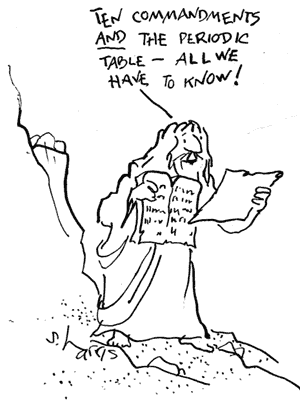Hi there everybody, I am a one-time hardcore YEC that recently switched my perspective to Theistic evoluton.
I once wrote a creationist paper for my English 101 and even gave a "debunking" speech against evolution for my speech class. Even visited ICR for sources since its not too far away. I've argued for creation science (whenever it came up) while witnessing to people for about 10 years.
Years later I no longer cared much for the debate but then just a few months ago I tried to do battle in a forum posting war about evolution (I am new to this posting biz) and got pummelled to say the least.
Now I'm no scientist but I realized there where answers to all the terrible creationist arguments. Not only that, but I realized how feeble creation science is and how it has almost no credibility and few Phd's.
I began researching if any church fathers, early Christians, had different views of Genesis. I came up on an ASA article called "The Contemporary Relevance of Saint Augustine". It changed my life. That was this summer. I've been researching ever since.
But its kind of messing with my mind still. I was used to having all the answers. I was used to Creation Science being a big part of why I believe the bible. So, I'm still a Christian, but a somewhat confused one. But maybe I just need to realize I don't have all the answers and I never really did.
My girlfriend is a med student who became a Christian about 2 years ago. She always believed in evolution but never formulated any sort of theology. Its funny because it really annoyed me then that she thought evolution was true, and I wonder if it was an act of God that caused my transition for her sake. I can see now how creation science would only have weakened her faith.
So anyway, I don't know any other theistic evolutionists so I'm going to have some questions for you guys because I'm still in a confused, transitory phase. But two things I know for sure: I am still a Christian and I'll never embrace creation science again. I hope to learn much here. Thanks for listening.

I once wrote a creationist paper for my English 101 and even gave a "debunking" speech against evolution for my speech class. Even visited ICR for sources since its not too far away. I've argued for creation science (whenever it came up) while witnessing to people for about 10 years.
Years later I no longer cared much for the debate but then just a few months ago I tried to do battle in a forum posting war about evolution (I am new to this posting biz) and got pummelled to say the least.
Now I'm no scientist but I realized there where answers to all the terrible creationist arguments. Not only that, but I realized how feeble creation science is and how it has almost no credibility and few Phd's.
I began researching if any church fathers, early Christians, had different views of Genesis. I came up on an ASA article called "The Contemporary Relevance of Saint Augustine". It changed my life. That was this summer. I've been researching ever since.
But its kind of messing with my mind still. I was used to having all the answers. I was used to Creation Science being a big part of why I believe the bible. So, I'm still a Christian, but a somewhat confused one. But maybe I just need to realize I don't have all the answers and I never really did.
My girlfriend is a med student who became a Christian about 2 years ago. She always believed in evolution but never formulated any sort of theology. Its funny because it really annoyed me then that she thought evolution was true, and I wonder if it was an act of God that caused my transition for her sake. I can see now how creation science would only have weakened her faith.
So anyway, I don't know any other theistic evolutionists so I'm going to have some questions for you guys because I'm still in a confused, transitory phase. But two things I know for sure: I am still a Christian and I'll never embrace creation science again. I hope to learn much here. Thanks for listening.



